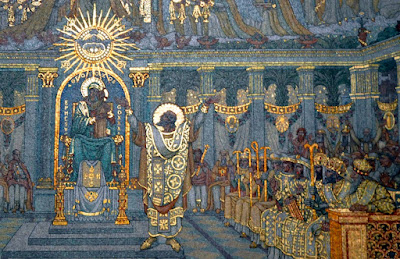According to Cardinal Roche, the Missal of Paul VI is “the richest Missal that the Church has ever produced” (source).
Interesting. We often find it is quite otherwise, simply by assisting at daily Mass.
Let's take a representative example, one of hundreds: the orations for today's feast in the Roman calendar, namely, St. Cyril of Alexandria, with a commemoration of St. Apollonia taken from the common of virgin martyrs. (On the modern calendar St. Cyril is a "memorial" on June 27, and St. Apollonia, age-old patron of dentists and toothache sufferers, has disappeared -- pulled out, in fact, like a rotten tooth.)
Here is a comparative chart that shows the six orations recited in the Roman Mass, versus one proper prayer in the Mass of Paul VI, with the two others to be taken from the common of bishops or of doctors.
The Collect is the only one that allows for direct comparison. In both, Cyril is hailed as an "invincible champion of the divine motherhood of the most Blessed Virgin Mary": excellent. Indeed he is, for Theotokos is the chief dogmatic fruit of the Council of Ephesus. But the old prayer goes on to invoke his intercession as well as Our Lady's intercession; indeed, we ask God by Cyril's intercession that we may be saved by Our Lady's intercession. This pattern of double intercession is also seen in some Byzantine prayers. In the Novus Ordo version, saintly intercession is altogether gone, and instead of a harmonious parallel between the divine motherhood and her motherly intercession, the prayer reaches for the low-hanging ecumenical fruit of the Incarnation. True, no doubt, but the entire Mass, after all, is about the Incarnation. The old Collect, rather, is focused on the Cyrillian defense of the divine motherhood.
When we look at the remaining propers, we can readily see how uncomfortable they would have made the reformers. The Secret for St. Cyril renews mention of his intercession, and then marvelously confesses the co-eternal glory of the Son with the Father: the kind of language that the reformers systematically purged in what I have demonstrated to be a "semi-Arian" tendency. The Postcommunion again points not only to the example but also the merits of St. Cyril and begs, strikingly, for the grace "to render fitting service to the most holy Mother of Thine only-begotten Son."
Meanwhile, the second Collect, for virgin martyrs, praises God for granting the triumph of martyrdom "even to the weaker sex" (in sexu fragili); when we consider the absolutely brutal manner in which the pagans tortured and killed Apollonia, we can understand the meaning. The second Secret tells the Lord we are confident of deliverance from evil by St. Apollonia's patronage. The second Postcommunion insists again on our reliance on the saint's intercession. This means that six times in the old lex orandi we are explicitly praying for and through the intercession of the saints. In the new lex orandi, this is mentioned exactly... zero times.
“The richest Missal that the Church has ever produced...” Orwell, meet your match.
 |
| The martyrdom of St. Apollonia |

